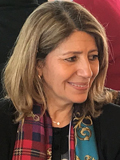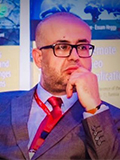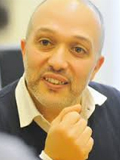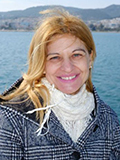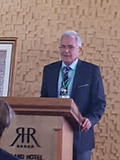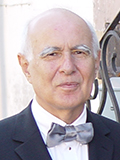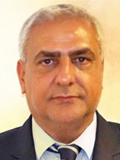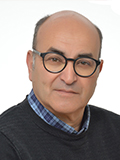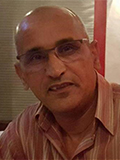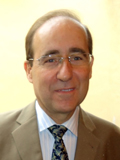Maria Snoussi is Professor at Mohammed V University in Rabat, Morocco and from 2017 to 2020, she acted as President of the Scientific Council of the French Research Institute for Development (IRD). Dr Snoussi is a coastal geoscientist focusing on ICZM and coastal risks. She is currently a member of the Steering Committee of Mediterranean Experts on Climate and Environmental Change (MedECC); Member of the Group of Senior Experts Officials (GSO) of the Blue Economy Initiative in the Mediterranean (BlueMed). She was also a member of the Scientific Steering Committee of the IOC/UNESCO Global Ocean Observing System (GOOS). She served as Technical Advisor to international agencies such as the World Bank and UNEP/MAP.
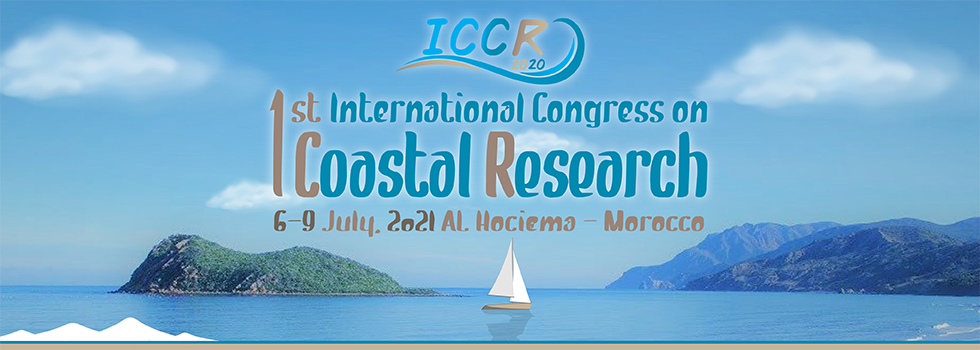
|
|
|
Keynote SpeakersPLENARY SESSION
Keynote Title : Integrated Coastal Zone Management (ICZM): a framework to tackle current and future coastal issues. ...
Keynote Title : How to get published in a scientific journal: Tips from a Springer Nature Editor Writing articles for scientific journals is very competitive. After generating data and idea from your research, how do you then produce a clear and concise paper that will attract the attention of journal editors and reviewers? How should you respond to reviewer report? A journal editor from Springer Nature in Heidelberg, Germany shares his advice on how to structure your paper, write a cover paper and answer to reviewer comments. Dr. Nabil Khelifi holds a PhD degree in Marine Geosciences from Kiel University in Germany. He is currently Senior Editor for Springer, part of Springer Nature in Heidelberg, Germany. He is managing Springer program in Middle East & North Africa (MENA) region. He received fellowships from START in 2005 and the DAAD from 2006 to 2010 to continue with his PhD studies. After his PhD in 2010, Dr. Khelifi received a postdoctoral research grant from the DFG to start his self-designed research projects at the GEOMAR Kiel, Germany on reconstructing past changes in oceanography and climate in the North Atlantic and the Mediterranean Sea using marine sediment samples retrieved by the IODP. He published his research work in some reputable journals. Dr. Khelifi also received funding from the ESF and some European universities to co-organize two workshops on Pliocene climate in Bordeaux, France (2009) and Bristol, UK (2013). He also received the Swiss Government Excellence Scholarship to continue with his research projects at ETH Zurich, Switzerland in early 2014. However, he decided in March 2014 to pursue his career as a Publishing Editor with Springer. He is mainly responsible for developing the Springer’s publishing program in MENA region. The program currently consists of developing 20 journals and publishing about 50 scientific books every year. Dr. Khelifi also helps researchers in MENA countries publish their work by delivering educational seminars for authors, reviewers, and journal editors to help improve publication output and quality. Dr. Khelifi is also a Visiting Lecturer at the University of Sfax, Tunisia and King Saud University, KSA giving MSc and PhD courses in geo-communication/-presentations and techniques of paper publishing, as well as career development training and professional development/soft skills workshops. Recently, Dr. Khelifi has been awarded with the 2016 Africa Green Future Leadership Award in recognition of work contributing to sustainable development through advancing science and promoting publications in Africa.
Keynote Title : The importance of IWRM for the balance of coastal areas ... An expert in integrated water resources management (IWRM), Mohamed Bouezmarni currently holds a position of resident twinning advisor of the European Union in Tunisia. He previously led an institutional support project for the water sector in Morocco and he coordinated and directed projects and researchs in Africa in the field of water and sanitation. In Belgium, he contributed for 24 years to many projects on water. He obtained a Master's degree in hydrology and a Ph.D from the Université libre de Bruxelles.
SESSION 1: COASTAL HAZARDS AND RISK ASSESSMENT
Keynote Title : Tsunami sedimentary records along seashore: setting up and deletion ... Dr. Wassmer is a professor of Geomorphology-Sedimentology, specialist in decrypting sedimentary records of high energy events (tsunamis, storms, pyroclastic flows, lahars). Identification and sedimentological of study of deposits having been set up by tsunamis along the coasts to reconstruct past events. Use of the technique of ASM (Anisotropy of Magnetic Susceptibility) to reconstruct the hydrodynamic characteristics of past tsunamis (highlighting of water movements during the marine invasion sequence, relative variations in water speed from the base to the top of the deposit, determination of the dominant deposit processes (traction or decantation).
SESSION 2: INTEGRATED COASTAL ZONE MANAGEMENT & TERRITORIAL INTELLIGENCE
Keynote Title : Current orientations of territorial intelligence, its new tools. Reflections on the threats to the coasts. A recent study finds a profound and exceptional oceanic metamorphosis due to the human impact on the global climate. The oceans are undergoing changes in their circulation and in their ecosystems which cause a mutation of plankton species, the displacement of fish species and increase coastal risks. In 2002, Europe set up the Integrated Maritime Policy (IMP) promoting an integrated planning and management approach for coastal zones (GIGZ). Confirmed by a Green Paper in 2006, it aims to "protect fragile and vital common heritage" and to safeguard their marine and terrestrial biodiversity, the attractiveness of their landscapes, their ecological balance, their ability to maintain the quality of life of the inhabitants. , as well as their seasonal attraction for the national and European populations [...] The rapidity of the changes observed requires sophisticated territorial observation to anticipate the hazards, the trajectories of vulnerability and the resilience of these areas in order to help decision-making and adaptation, by implementing Prof. JEAN-JACQUES GIRARDOT
Keynote Title : Climate Change and Sustainable Water Resources In recent times, several studies have shown that climate change is likely to have a significant impact on the availability of freshwater resources. Freshwater-rich regions across the globe are projected to face water scarcity if current reserves are not managed effectively. Traditionally, some regions have been well endowed with large freshwater reserves, but demand for water has already increased manifold over the years due to an increase in agriculture, industrialization, urbanization, population and economic development.This has resulted in water scarcity and water quality problems in some regions... Prof. Attia Ahmed Mansour EL-GAYAR is a professor in Management of soil, water and environment at the Soil, Water & Environment Research Institute. Giza (12619), Egypt. He is an international expert, advisor at the Egyptian Foreign Ministry and advisor to the Ministers of Agriculture and Irrigation of the State of Rwanda. Prof. El Gayar has formulated, coordinated and implemented several Scientific research projects: Egypt, Sudan, Algeria, Tunisia, Morocco, Syria, Iraq, Saudi, Spain, Canada, Australia, Cuba, Ecuador ,Uganda, Sierra Leone, Central Africa, Democratic Republic of Congo, Burundi, Rwanda, Malawi, Somalia , India, USA.... Prof. El Gayar is an accomplished scientific writer, with over 100 publications in international journals and more than 200 communications in national and international conferences, co-authors of four Books chapter. Occasional referee in several mnternational journals in the field of Management of soil, water and environment (Water & Soil sciences, Environmental Science & Technology, Hydrology, Environmental Pollution, Climate change and feasibility studies).
SESSION 3: OCEANOGRAPHY, COASTAL ECOLOGY AND RESOURCES
Keynote Title : Use of the DESSIN framework to assess the sustainability of the technical responses to coastal erosion of Greek beaches due to Climate Change ... Ourania Tzoraki is a Professor in the Marine Sciences Department of the University of the Aegean, Greece. Her expertise is integrated river basin and coastal zone Management. Main research topics: (a) Hydrology, water quality and sediment transport modelling of Intermittent and Ephemeral Streams (IRES); (b) Operational hydrology, i.e. early flood warning systems, UAVs for Particle Image Velocimetry (c) Coastal Zone Management approaches (Ecosystem Processes, coastal aquifers recharge technologies).
SESSION 4: GEOMORPHOLOGY AND COASTAL PROCESSES
Keynote Title : The past, present and future of climate change. Impact on the coast The conference presents geological witnesses relating to climate change, discusses the diversity of their causes and some cases of threats from current global warming and analyzes the reliability of alarming climate forecasts as regards their impacts, particularly on coastal areas. Prof. Aberkan holds a PhD degree in Sciences from Bordeaux University in France. He is currently Professor of Higher Education at the Faculty of Sciences of Rabat, Mohammed V University (Morocco). Prof. Aberkan has supervised several theses and research projects, he is an accomplished scientific writer with several publications on the geology of the Atlantic and Mediterranean coasts of Morocco, and several communications in conferences in Morocco and abroad on Quaternary Geology and climatic and eustatic variations. Prof. Aberkan has contributed to numerous workshops and seminars on heritage, the environment and sustainable development.
Keynote Title : Statistics & Sedimentology : 80 Years of Ambiguity In practice, grain size analysis uses the Laplace-Gauss distribution. However, from the sedimentological point of view there few arguments for using and abusing this symmetrical law. Bagnold (1936) showed the interest of an asymmetric law, this demonstration was extended to hyperbolic Log hyperbolic, Log Laplace and Log-skew Laplace laws. We try here to explain that the asymmetric laws are useful to sedimentologists. These tools allows to determine the ebb and flow of tides, the "Uprush" and "Backwash" for tsunamis. ...
SESSION 5: COASTAL WATER RESOURCES, HYDROLOGY AND HYDROGEOLOGY
Keynote Title : Groundwater discharges to the Bay of Bengal: implications to tropical coastal ecology ... Prof. Abhijit Mukherjee, PhD graduated from the University of Kentucky, USA and completed postdoctoral work at the University of Texas at Austin, USA. He also served as the Physical Hydrogeologist at the Alberta Geological Survey in Canada. He is currently an Associate Professor at the Department of Geology and Geophysics, and School of Environmental Science and Engineering at the Indian Institute of Technology Kharagpur (IIT Kharagpur), India. His main research areas are physical, chemical and isotope hydrogeology, including modeling and contaminant transport, as well as water resource management and the effects of climate change on the hydrosphere. He has been conferred the National Geoscience Award by the President of India.
Keynote Title : Marine plastic pollution, case of Moroccan seafloor ... Dr Rachida HOUSSA, PhD from the university Louis Pasteur of Strasbourg (France), work, since 1998 at the National Institute for Fisheries Research of Morocco (INRH: Instritut National de Recherche Halieutique) where she has held several positions of responsibility. Her work for more than 20 years in INRH gave her the opportunity to lead the development of numerous activities related to the marine environment, fisheries research and coastal management, and to work in close collaboration with different national, regional (Maghreb and West Africa) and international (Western Europe, Russia, Japan, etc.) teams working in different fields of marine research.
Keynote Title : The United Nations Decade of Ocean Science for Sustainable Development (2021-2030): Opportunities for Africa ... Dr Karim Hilmi is actually a Research Director at Institut National de Recherche Halieutique (INRH) in Casablanca. His background is on physical oceanography, hydrodynamic modeling and his research is focused on physical oceanography, hydrodynamic models and impacts of climate change on fisheries ressources. Since 2015, he is the National Focal Point of IOC/UNESCO and he acted from the period 2019- 2021 as a Vice Chair of Group V (Africa and Arab Region) and the Chair of the Intersessional Financial Advisory Group (IFAG) and the Financial Committee (FC) at IOC/UNESCO. He is involved in many IOC programs and member of many IOC steering committees. Since 1997, he is also involved in IPCC Working Group II (WGII: Impacts, Adaptation and Vulnerability) as a Co Author (CA), Coordination Lead Author (CLA) and Reviewer in many IPCC Assessment Reports (AR3, AR4, AR5 and AR6), mainly for Africa and Ocean Chapters.
Keynote Title : Contribution of geopgysical methods to shallow aquifers exploration in the basin of Sakia El Hamra - Oued Eddahab basin, Morocco. ... Project manager in water resources study & Senior hydrogeophysicist engineer and Manager of the company AFRICA GEO-SERVICES. PhD in hydro-geophysics at the Laboratory of Geodynamics and Natural Resources (LGRN), Faculty Dhar El Mahraz Fès.
Keynote Title : Coastal aquifers: problematic and approaches. ... Dr Lhoussaine Bouchaou has completed his PhD at the age of 27 years from University of Franche-Comté (France) and Doctorate of state from University of Cadi Ayyad (Morocco) in 1995. He is senior professor at Ibn Zohr University of Agadir (Morocco) since 1995. His research is focusing mainly on “contribution of Chemical and isotopic tracers for water resources management in semi-arid areas, salinity of water and soil, karst hydrology, environment, climate change and its impact on natural resources in arid zones”. He is Leader of several national and international research contracts (EU, IAEA, UNESCO, NATO, EU, CNRS, CNRST, IRD, ABH, ACADEMIE Hassan II,…..) since 1990s and supervisor of about 25 PhD students. He has published more than 100 papers in reputed journals, serving as reviewer member of repute journal and international expert in water resources topic. He was former president of Moroccan chapter of International Association of Hydrogeologists (IAH) 2003-2016. Affiliated professor to IWRI, UM6P since July 2019.
SESSION 6: NEW WATER TREATMENT TECHNOLOGIES
Keynote Title : Water treatment technologies in coastal areas ... JOSE MARIA QUIROGA ALONSO es Catedrático de Universidad en el área de Tecnologías del Medio Ambiente de la Universidad de Cádiz donde imparte docencia para los estudiantes de grado y de doctorado en materias de Contaminación e Ingeniería Ambiental. Ha dirigido 22 tesis doctorales en temas relacionados con ingeniería y contaminación ambiental.
|
